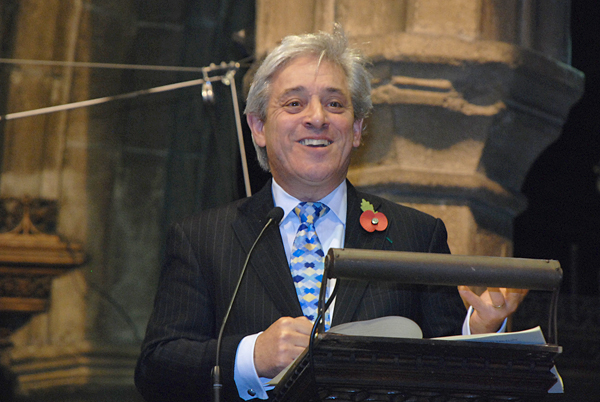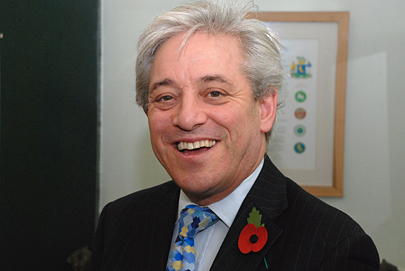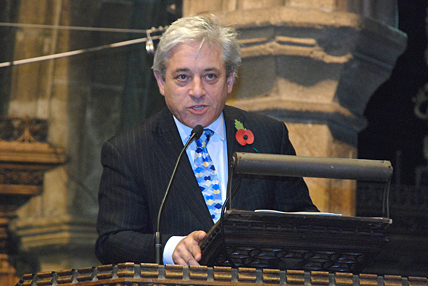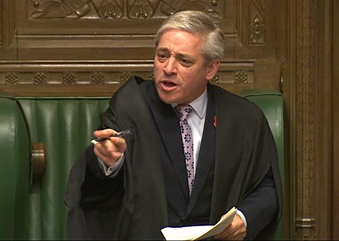Speaker of the House John Bercow delivers J.H. Whitley Lecture

Fri, 07 Nov 2014 13:03:00 GMT
“...if our Parliament wants to be respected by young people, we should respect young people...”
 THE Speaker of the House of Commons, John Bercow MP, outlined a three-point plan to make Parliamentary politics more relevant to young people when he delivered a special lecture co-organised by the University of Huddersfield.
THE Speaker of the House of Commons, John Bercow MP, outlined a three-point plan to make Parliamentary politics more relevant to young people when he delivered a special lecture co-organised by the University of Huddersfield.
Mr Bercow – who stated that he intends to stands for re-election as Speaker in 2015 – also signalled support for the idea of taking Parliamentary debates, including Prime Minister’s Question Time, away from Westminster and around the country. It might lead to less rowdy sessions, he argued.
He was speaking at Halifax Minster and was giving the third annual J.H. Whitley Lecture, in a series that commemorates a former Halifax MP, John Henry Whitley, who was Speaker of the Commons during the politically turbulent 1920s. The J.H. Whitley Archive is deposited at the University of Huddersfield, after being chosen by his family.
Previous lecturers in the series have been historians who analysed Whitley’s life and times. Mr Bercow was the first politician to deliver the J.H. Whitley Lecture and he paid tribute to his forbear, whom he described as “extraordinary” for refusing a knighthood or peerage after leaving office in 1928.
Engaging with young people
Mr Bercow’s lecture was entitled Can old Parliament be relevant to young people? and he stated that “worryingly large number of young people are cynical or sceptical about politics”.
But he added that to speak of ‘young people’ as if it was a vast collective is simplistic and he did not accept that young people were disengaged with politics.
“They might be disengaged with party politics, but that is not the only form of engagement,” he explained.
Mr Bercow said that he had been highly impressed by the Youth Parliament – with its “intensity of campaigning on issues such as environment and poverty” – and described the zeal of 16-year-old voters in Scotland during the independence referendum.
Party politics were stratified around group or tribe. But “post-party politics” were based on networks rather than groups and they were “more fluid and more dynamic”. Social media and smartphones provided young people with compelling alternative to committee meetings.
Mr Bercow’s first priority is to make Parliament more relevant by leading rather than following. He had revived the procedure of known as Urgent Questions, which allowed MPs to debate topical issues.
Parliament must recognise new and social media
 His second goal is to improve the ways in which Parliament communicates. New media and social media are replacing the media of the past. Parliament must recognise this reality,” said Mr Bercow.
His second goal is to improve the ways in which Parliament communicates. New media and social media are replacing the media of the past. Parliament must recognise this reality,” said Mr Bercow.
“There has been a quiet revolution in how human beings interact with one another and young people have adapted to this the most. But Parliament has adapted in only a limited way. It has a fine website, but is that enough?”
One year ago he established the Digital Democracy Commission, to ask questions such how Parliament could be better at scrutinising legislation and promote public engagement. The Commission’s findings will be “bold and compelling”, said Mr Bercow, and would be issued in 2015, the year that marks the 800th anniversary of Magna Carta.
“But I should like 2015 to be a moment of looking to the future, with no complacency about the past,” said the Speaker.
His third aim to set out a “welcome mat” at the Houses of Parliament by making the buildings more accessible. He himself hosts regular visits to Speaker’s House and plans are advanced for an educational centre that will be visited by thousands of schoolchildren.
“It is not obligatory for you to move towards us, but for us to adjust our practices,” said Mr Bercow. “We must make the case for young people that Parliament belongs to them as well as older people.”
 After his lecture, he fielded a range of questions from the audience. He said he was open to the idea of taking Parliamentary sessions, including Prime Minister’s Questions, around the country and acknowledged that the level of barracking in the House put many people off. The party Whips could do much to change this behaviour, said Mr Bercow, but he also said that “it might change the tenor if we held debates outside the House”.
After his lecture, he fielded a range of questions from the audience. He said he was open to the idea of taking Parliamentary sessions, including Prime Minister’s Questions, around the country and acknowledged that the level of barracking in the House put many people off. The party Whips could do much to change this behaviour, said Mr Bercow, but he also said that “it might change the tenor if we held debates outside the House”.
He also affirmed his support for lowering the voting age to 16 and emphasised his respect for the Youth Parliament. “If our Parliament wants to be respected by young people, we should respect young people,” he said.
Mr Bercow – who suggested the Halifax location for the lecture because of the town’s links with J.H. Whitley – was introduced by the Bishop of Wakefield, The Rt Revd Tony Robinson, and by J.H. Whitley’s grandson John Whitley, who played the key role in depositing the Whitley Archive at the University of Huddersfield.
After the lecture, the University’s Pro-Vice Chancellor for Teaching and Learning, Professor Tim Thornton, thanked Mr Bercow for a lecture “characterised by a powerful mix of wit, insight and gravity”.
Back to news index - November






